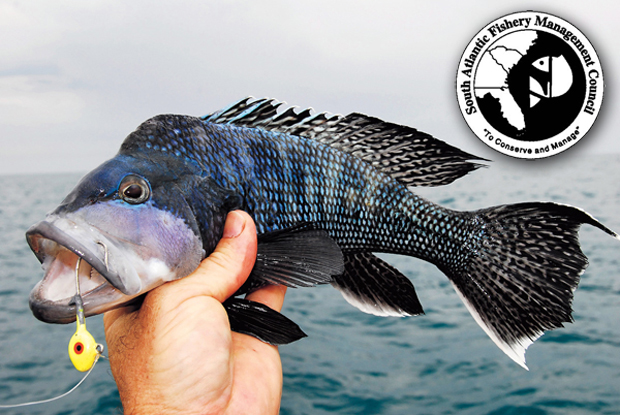May 14, 2013
By Florida Sportsman Editor
Federal managers approve amendment for Secretarial review and increase in 2013 fishing season.

The South Atlantic Fishery Management Council approved measures to increase the Annual Catch Limit (ACL) for black sea bass in the South Atlantic region during a special one-day meeting held yesterday. In a compromise vote, the Council approved an increase from the current limit of 847,000 pounds (all measures in whole weight) to 1,814,000 pounds. The increase would be effective for 2013, 2014, and 2015. For 2016 and beyond, the ACL would be 1,756,450 pounds until changed. The meeting, held via webinar, was called by the Council to help expedite the proposed increase for the 2013 fishing year. A recent stock assessment shows that the black sea bass stock in the South Atlantic is no longer undergoing overfishing, is not overfished, and the stock is rebuilt. The assessment, as reviewed by the Council's Scientific and Statistical Committee, allows for an increase the ACL.
If approved by the Secretary of Commerce, the changes would be implemented through Regulatory Amendment 19 to the Snapper Grouper Fishery Management Plan. The amendment initially included three alternatives, a "no action" alternative leaving the current ACL in place and a second alternative to increase the ACL to 2,133,000 pounds in 2013, a value equal to the Acceptable Biological Catch as recommended by the Scientific and Statistical Committee, with a decrease in catch limits in subsequent years. The third, more conservative alternative would have allowed for an increase to 1,756,450 pounds per year for 2013-2015. After reviewing public comment and discussing the three alternatives, a fourth alternative to increase the ACL to 1,814,000 pounds was introduced and approved by the Council. The alternative represents a compromise between the two initial values considered by the Council in alternatives 2 and 3.
During the meeting, Council members acknowledged the need to provide fishermen an opportunity to maximize harvest of the recovered stock given hardships experienced by both commercial and recreational fishermen. Harvest levels for black sea bass have been reduced since 2006 to end overfishing and rebuild the stock. The current ACL has severely restricted fishing seasons as the stock recovered. Fishermen have consistently expressed frustration in limited seasons while seeing increases in the number and size of black sea bass.
However, Council members also expressed concerns that allowing the maximum harvest of over 2 million pounds could allow overfishing to occur in the future, given that the value is above the Maximum Sustainable Yield for black sea bass. The compromise alternative was approved by the Council by a 10 to 3 vote, with Council members agreeing that an update to the black sea bass stock assessment will be needed by 2016.
The Council's intent is to have the increase in place in 2013 in order to help extend this year's fishing season, which begins June 1st for both commercial and recreational fishermen. The ACL is currently divided between the two sectors, with 57% allocated to recreational fishermen and 43% to the commercial sector.
The Council also approved an action in the amendment to implement a seasonal closure (November 1 through April 30) for the commercial black sea bass pot fishery. The seasonal closure would address potential gear interactions with large whale migration and right whales during calving season. Measures approved by the Council in Regulatory Amendment 19 must be reviewed by NOAA Fisheries before final approval and implementation.
In addition to black sea bass management, the Council addressed proposed measures affecting Gulf of Mexico for-hire Federal permit holders due to joint management plan requirements. Additional details about the meeting, including a copy of Regulatory Amendment 19 to the Snapper Grouper Fishery Management Plan, are available from the Council's website at www.safmc.net. The Council will receive an update on the status of the amendment and the Secretarial review process during its next scheduled meeting June 10-14, 2013 in Stuart, Florida.
